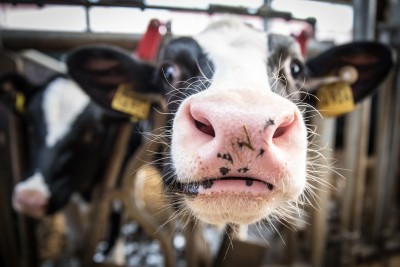Keeping Dairy Calves Cool in Warm Weather
Alycia Drwencke, Dairy Management Specialist
Southwest New York Dairy, Livestock and Field Crops Program

Keeping Dairy Calves Cool in Warm Weather
Cornell Cooperative Extension shares information on the benefits of providing heat abatement to calves
By Alycia Drwencke, Dairy Management Specialist, with the SWNY Dairy, Livestock and Field Crops Program
SOUTHWEST NEW YORK (May 20, 2021) - Cornell Cooperative Extension's Southwest New York Dairy, Livestock and Field Crops Program (SWNYDLFC) shares information on the benefits of keeping dairy calves cool for the 2021 season.
Traditionally, conversations around cooling on dairy farms have focused on the lactating portion of the herd. This is in part due to the added body heat that milk production has on cows, but also to improve efficiency as heat stress can decrease milk yield. As research evolves and weather patterns change, the importance of keeping dairy calves cool is becoming clearer.
Thanks to research that has been published throughout the last 10 years there is a better understanding of how warm weather can affect dairy calves. Interestingly, calves can experience negative effects of warm weather both before they are born and after. If a calf's mother is heat stressed before birth, the calf will have decreased milk production throughout her life, lower body weight at birth through weaning, impaired immunity and less effective absorption of immunoglobulins from colostrum. Additionally, these calves will have daughters that produce less milk underlining the long term effects of heat stress. If a calf is not provided cooling after birth, they will eat and grow less, have increased instances of illness and decreased immunity. These negative effects highlight the importance of making sure dry cows are cooled with shade, fans and spray water leading up to birth and once calves are born they are provided shade and fans for cooling.
To assist with keeping calves cool they should be provided ample amounts of clean, cool water. If calves are housed in hutches, providing shade cloth or reflective tarps over their shelter is beneficial. Additionally, orienting shelters to take advantage of the prevailing winds and promote air flow is ideal. Other ways of increasing airflow in the shelter will also help with keeping calves cool, such as opening windows or vents, propping hutches on cinder blocks and adding fans. When calves are in a barn it is important to look at the ventilation and provide fans. Finally, the bedding material and cleanliness can influence calf cooling. Using bedding that holds less heat, such as sand, rice hulls, or sawdust and keeping it clean can promote better cooling for calves.
When calves are cooled effectively it will prevent rises in respiration rate and body temperature, prevent panting, and promote solid feed and milk intake. Calves should be monitored for signs of heat stress when the temperature-humidity index reaches 68 or higher (approximately 75 degrees Fahrenheit with 20% humidity). Cooling calves with shade and fans can promote their health and productivity throughout their life. For more information about cooling for dairy calves, contact Alycia Drwencke, Dairy Management Specialist, at 517-416-0386 or amd453@cornell.edu.
Keeping Calves Cool (pdf; 868KB)
Upcoming Events
WEBINAR - Automated Milking Systems Efficiency: Balancing Focus on Individual Cows and System Optimization
May 8, 2024
Please join Cornell the SWNY team and MSU Extension for our talk with Dr. Pablo Silva Boloña on improving efficiency of Automated milking systems by focusing on milking settings for individual and group success.
Broiler Field Day at Sunny Cove Farm
June 6, 2024
Alfred Station, NY
Join us for a field day to explore broiler production, processing, and finances. Meghan Snyder of Sunny Cove Farm will be our host. She raises small batches of organic broilers, processing them on-farm under the 1,000 bird exemption.
Cornell Seed Growers Field Day
July 2, 2024
Ithaca, NY
Please Save the Date for the Cornell Seed Growers Field Day to be held the morning of July 2nd. The event will be held at the NYSIP Foundation Seed Barn, 791 Dryden Rd., Rt. 366, Ithaca, NY.
Announcements
No announcements at this time.





